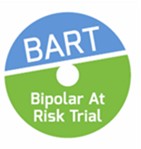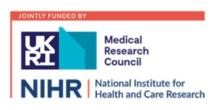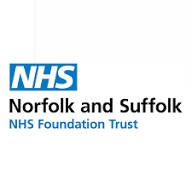Cognitive Behavioural Therapy in comparison to Treatment as Usual in adults at high risk of developing bipolar disorder (Bipolar At Risk): A randomised controlled trial to investigate the efficacy of a treatment approach targeted at key appraisal change (BART II)
Health service providers are recognising that it can be helpful to offer treatment and support to young people who are starting to experience psychological distress. Such treatment may help to reduce feelings of distress experienced. Recent research has shown that identifying people early on who experience mood swings can prevent these problems from becoming worse.
Criteria have recently been developed to identify the experiences of individuals who have mood swings and therefore considered at risk of developing Bipolar Disorder. These criteria are called Bipolar At Risk (BAR). This study will build on this previous research by using the BAR criteria to identify young adults with these experiences and find out if offering them a new kind of Cognitive Behaviour Therapy (CBT), called CBTBAR, is helpful. The development of CBTBAR was informed by the results of a previous NIHR) trial, called the Bipolar At Risk Trial (BART), conducted from 2015 to 2018 in Greater Manchester Mental Health NHS Foundation Trust (GMMHT).
BART II aims to recruit 338 participants from 5 community-based NHS sites in the UK: Greater Manchester, Lancashire, Sheffield, Birmingham, and Norfolk & Suffolk, with recruitment starting in February 2023. People will be invited to take part in the study if they are experiencing mood swings and aged between 16 to 25. Following consent, participants will be randomly assigned to one of two possible treatment groups: treatment as usual, or treatment as usual plus the CBTBAR intervention.
Privacy Notice: How we use your research data
The CBTBAR intervention will be delivered individually by experienced trial therapists and will last for up to 26 sessions (over a 6-month time period). Participants will fill in questionnaires about mood swing symptom severity, service use, functioning and quality of life as well as sleep quality and substance use. A semi-structured interview will also be conducted to assess for mood diagnoses when they start the study and at 17, 27 and 52 weeks to assess their progress. A research assistant will contact all participants after 9 months for a quick check-in phone call. In addition, those offered/received the CBTBAR may also be invited to take part in an optional, qualitative interview conducted by a service user researcher to find out how the therapy might have been helpful.
This trial provides an opportunity for individuals who meet the BAR criteria to receive high quality treatment and support, and for researchers to gain a better understanding of the effectiveness of the unique CBTBAR intervention. The BART II trial aims to improve the lives of those who are at higher risk of developing bipolar disorder and contribute to the advancement of knowledge in the field.
Funding
| Funders(s) | EME AND The Medical research Council Ref: NIHR 132622 |
|---|---|
| Start Date | April 2022 |
| End Date | March 2026 |
Members
YTU Team
- Catherine Hewitt (Co-Investigator)
- Jude Watson (Co-Investigator)
- Lesley Sinclair (Trial Manager)
- Rachel Ellison (Trial Coordinator)
- Izzy Coleman (Statistician)
- Luke Strachan (Trainee Statistician)
External Members
- Dr Sophie Parker, Chief Investigator (Director & Consultant Clinical Psychologist, Youth Mental Health Research Unit & Psychosis Research Unit), Greater Manchester Mental Health NHS Foundation Trust
- Dr Lydia Pearson, Trial Manager, Greater Manchester Mental Health NHS Foundation Trust
- Mr Anton Strong, Service User Researcher, Greater Manchester Mental Health NHS Foundation Trust
- Dr Chris Sutton, Trial Methodology & Statistics, University of Manchester
- Dr David Shiers, Carer Consultant, Greater Manchester Mental Health NHS Foundation Trust
- Dr Gemma Shields, Health Economist, University of Manchester
- Dr Heather Law, PPI Lead, Greater Manchester Mental Health NHS Foundation Trust
- Dr Jonathon Wilson, Consultant Psychiatrist and Research Director, Norfolk and Suffolk NHS Foundation Trust
- Prof. Matthew Broome, Prof of Psychiatry and Youth Mental Health, University of Birmingham
- Emma Cernis, Clinical Psychologist, University of Birmingham
- Prof. Richard Bentall, Clinical Psychology, University of Sheffield
- Dr Sarah Peters, Qualitative Lead, University of Manchester
- Ms Sarah Leo, Head of R&I, Sponsor, Greater Manchester Mental Health NHS Foundation Trust
- Prof. Steve Jones, Director of Spectrum Centre for Mental Health, Lancaster University
- Dr Timothy Clarke, Research Clinical Psychologist, Norfolk and Suffolk NHS Foundation Trust
- Ms Wendy Jones, Service User Researcher, Greater Manchester Mental Health NHS Foundation Trust
Signposting
If you would like to talk to someone about your mental health there are many different ways you can access information and support.
- Mind – provides information, training, and support for people with mental health problems and their families: Mind website (mind.org.uk)
- Rethink Mental Illness – provides information, training and support for people with mental health problems and their families: Rethink Website (rethink.org)
- Bipolar UK – provides information and support for people with bipolar, including support groups and support lines: Bipolar UK Webpage (bipolaruk.org)
- Campaign Against Living Miserably – provides online information and telephone/online chat support to people experiencing distress: Campaign Against Living Miserably Webpage (calmzone.net)
- The Hub of Hope – provides details of mental health support services in your area (UK only): The Hub of Hope Webpage (hubofhope.co.uk)
- Patient Advice and Liaison Service (PALS) - provide a point of contact for patients, their families and their carers to offer confidential advice, support and information on health-related matters: What is PALS (Patient Advice and Liaison Service)? - NHS (www.nhs.uk)
If you need more urgent help and are already in contact with mental health services, please contact them directly. If you are not in contact with mental health services, the following might be helpful:
- Your usual GP practice
- Your local out of hours GP or Accident and Emergency. Please visit nhs.uk if you’re unsure where to find these services
- If you are unsure of what help you need, call 111 for the NHS telephone advice service
- For someone to talk to over the phone, call Samaritans on 116 123 or email jo@samaritans.org
- If you feel there is a serious and immediate risk, please call the emergency services on 999








